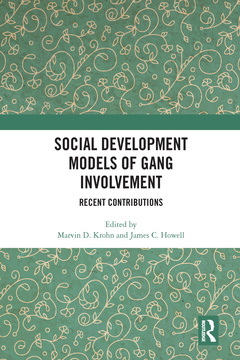Social Development Models of Gang Involvement Recent Contributions
Coordonnateurs : Krohn Marvin D., Howell James C.

This book?containing contributions from scholars who are well-known for their research on gangs, and selected as experts on the assigned topics?examines youth gangs from a developmental/life-course perspective, exploring a myriad of issues related to gang membership, its causes, its consequences, and various intervention efforts to both prevent gang membership and reduce the problematic impact of gangs.
Beginning with research exploring the intergenerational continuity in gang membership and examining the causal processes leading to gang membership, the structure of the book reflects the developmental sequence of gang membership. The consequences of gang membership for youth are examined, as are intervention strategies. The book also presents the first conceptual framework on female gang involvement, taking into account the differences in the paths and roles that women and girls may take into the gang. The book concludes by exploring how gang membership affects job possibilities for young adults.
This book was originally published as a special issue of the Journal of Crime and Justice.
Introduction1. Exploring intergenerational continuity in gang membership2. Developmental pathways of youth gang membership: a structural test of the social development model3. Differentiating between delinquent groups and gangs: moving beyond offending consequences4. School transitions as a turning point for gang status5. Leveraging the pushes and pulls of gang disengagement to improve gang intervention: findings from three multi-site studies and a review of relevant gang programs6. Toward a multiracial feminist framework for understanding females’ gang involvement7. The practical utility of a life-course gang theory for intervention8. The labor market and gang membership in adulthood: is the availability, quality, and nature of legal work associated with adult gang involvement?
Marvin D. Krohn is a Professor in the Department of Sociology and Criminology & Law at the University of Florida, Gainsville, USA. He is primarily interested in developmental and life-course approaches to the explanation of delinquency, drug use, and crime. He is a Fellow of the American Society of Criminology.
James C. Howell is a Senior Research Associate with the National Gang Center, Tallahassee, USA. He is author of The History of Street Gangs in the United States (2015), and a textbook, Gangs in America’s Communities (2019). His numerous other works on youth gangs include a developmental theory of gang involvement.
Date de parution : 06-2020
17.4x24.6 cm
Date de parution : 11-2018
17.4x24.6 cm
Mots-clés :
Gang Membership; Gang Involvement; Youth gangs; Antisocial Behavior; Social development model; Gang Desistance; Gang membership development; Gang Members; Female gang involvement; Gang Joining; Predicting Gang Membership; Young Men; Gang Membership Status; Delinquent Peer Group; Adult Membership; Intergenerational Continuity; Father Son Dyads; Peer Group Size; Prosocial Opportunities; RYDS; Delinquent Group; Labor Market Variables; SDM; School Transitions; Gang Status; Multiracial Feminist; Prior Violent Behavior; Missing Data; Adult Gang Members



